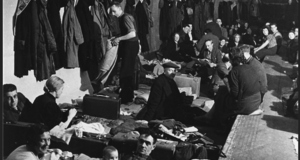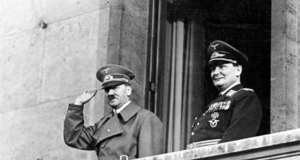On November 11, 1914, the British set out in the most literal sense to starve the German people into submission; an idea best described by First Lord of the British Admiralty Winston Churchill himself when he stated, "The British blockade treated the whole of Germany as if it were a beleaguered fortress, and avowedly sought to starve the whole population - men, women and children, old and young, wounded and sound - into submission." By 1917, this mission was rapidly coming into fruition, and every month the war was prolonged, the situation in Germany became even more dire. While the German people certainly experienced hardship during 1914-1916, it was during the last two years of the war that their suffering reached its zenith. It was also during this period that the frontline soldiers began to truly feel the effects of the blockade for the first time. This section will look into how the blockade effected life in the German homeland, and at the front lines during the last two years of the war.
One of the compounding reasons that civilian life continued to deteriorate in Germany was because the longer the blockade was in place, the more effective it became. As noted earlier, while the blockade saw a slow start, the longer a peace was delayed, the more time British agents had to locate leaks, and for British officials to swing neutrals in-line with the allies war aims. By the beginning of 1917, the blockade had been in effect for almost two and a half years, and early obstacles such as Germany's ability to obtain large stocks of canned meats at the Danish port of Copenhagen were adequately addressed. By 1917, only Sweden, and a handful of other minor sources on the European continent were selling goods to Germany, and these were nowhere near enough to meet the countries pre-war needs, let alone the increased demands due to the scale and pace of WWI. In short, by 1917 the blockade had truly begun to change the face of the German war effort because it threatened Germany's ability to feed, clothe, and arm itself for the long haul.
The situation in Germany going into 1917 was one of growing chaos, disorganization, and sickness all stemming from the blockade, and subsequently Germany's inability to provide its people with adequate provisions to sustain normal productive lives. While few individuals starved to death between 1914-1918 - official British post-war statistics counted that 772,736 starved to death because the blockade - millions did succumb to malnutrition which led to severe decreases in body mass, and nearly constant suffering from various medical aliments. According to a post-war analysis conducted by University of London physiologist Ernest Starling, throughout 1917-1918, the average German ate less than 1500 calories per day, down from the already meager diet of 1700 calories per day in 1916. Both of these averages were of course significantly less than the 4020 calories per day consumed by the average German in the pre-war years. Starling contends that these drops in the provisions caused the average civilian's body weight to drop by as much as 15-20% by the end of 1917.
These unsustainable eating habits, and unhealthy weight loss caused a greater proportion of the German population to suffer from a host of chronic illnesses which ranged from mild aliments like influenza and dysentery, to more serious afflictions such as typhus, tuberculosis, and scurvy. Vincent noted that between 1917-1918, the number of tuberculosis related deaths increased seventy two percent when compared to 1913 statistics. One possible reasoning for this drastic increase in fatalities is that without access to foods containing proper nutrients, the body's immune system begins to shut down, leaving the individual highly susceptible to contracting communicable diseases.
It should not be assumed that these conditions were entirely the result of poor diets. Rather a large reason the German masses suffered from nearly constant illness was due to the fact that cleaning products such as soaps and detergents were strictly rationed, or completely unavailable during the war. Similarly, new clothing and articles like towels, rags, and linens were also in short supply. Vincent argues that even though millions of Germans wore unclean and tattered clothing, or lived in less than tidy surroundings, the majority of these illnesses could have been prevented, or at the very least properly treated with an adequate diet. Thus because the British blockade prevented Germany from importing foodstuff, the population was unable to properly feed themselves and maintain basic body functions. Combined with the scarce availability of cleaning products or fresh clothing, a great proportion of the German population was keenly susceptible to infections and disease.
The blockade did not exclusively affect German population, but also impacted the livestock throughout the country as well. As discussed in the previous section, most of the foodstuff imported by Germany was not directly consumed by humans, but was used as provisions for the countries farm animals. According to Vincent, nine-tenths of the meat consumed in Germany came almost entirely from livestock that feed on foreign imported fodder. These farm animals also provided most of the country's dairy produce, which included milk, cheeses, and butter, of which the latter two were staple products in the German diet, and regarded with the utmost importance. Without access to quality fodder, farm animal's health began to suffer, and they subsequently produced less than adequate byproducts for human consumption. According to one report from the Centre for the Care of the Young, the results of cattle that ate less nutritious foods was milk that was 'considerably watered,' and lacked fats needed for youth during this important stage of development. This was therefore a classic example of an imbalance at one end of the food chain effecting the next link's livelihood and vitality.
By 1917, and going into 1918, German livestock counts reached all time lows, and those that survived weighed significantly less than they would have if proper fodder supplies were available (see Graph 1.1 in Appendix). As the war dragged on into a third year, swine stocks fell by nearly seventy-seven percent of pre-war levels, and cattle to just thirty-two percent of peacetime inventory. What remained of these important sources of human nourishment were severely emaciated animals that often provided little or no meat for human consumption (see Graph 1.2 in Appendix). Without access to large quantities of foodstuff because of the blockade, German farmers were unable to provide adequate nourishment to their livestock, which left the population with foods that were neither filling, nor adequate to meet their nutritional needs.
The unhealthy dietary realities seen throughout Germany in 1917-1918 caused more than just ailing bodies, more importantly they caused the overall morale and faculties of the general population to shift as well. It should be no surprise that the longer the German people went hungry, the more their moral senses shifted to a more animalistic instinct to act outside established conventions in order to survive. As Miles Bouton argues:
No moral sentiments, even the most exalted, can prevail against hunger. Starving men will fight or steal to get a crust of bread, just as a drowning man clutches at a straw. There have been men in history whose patriotism or devotion to an idea has withstood the test of torture and starvation, but that these are the exception is shown by the fact that history has seen fit to record their deeds.
According to a report entitled Hunger, issued by The School Care Committee Section of the Berlin Teachers' Union, "The moral sense was in many cases deadened by the animal fight for existence. The feelings of physical pain, hunger and thirst, physical exhaustion and enervation, dominated nearly all sensations, and often influenced desire and action." As food became more scarce, German civilians began acting out primal instincts to feed themselves, and in many cases this need dominated their entire lives. According to the same report, morals, cultural norms, and laws were often blatantly disregarded as millions sought to obtain what they and their families needed to survive. This often caused otherwise law abiding citizens to engage in illicit acts such as theft, cheating, or assaulting other citizens in their never ending quest to feed themselves (see figure 1.3 in Appendix).
This growth in criminality was not confined to one age range in the German population. German youth and adolescents also acted outside the law with increasing frequency in 1917-1918. According to Berliner Ruth von der Leyen:
Juvenile criminality grows and grows. There is no sign of it lessening. The reformatories and the prisons are completely full [...] only the cruelest need, caused by England's starvation blockade has effaced the strong sense of right and duty in German youth.
In the southern German city of Stuttgart alone, within a three month span in 1917, two hundred and seventy three children ranging between the ages of twelve and fourteen were arrested, and convicted of theft. In every one of these cases, the accused child was charged with attempting to steal food from farms. Like their fellow adults, children were acting out of a primal instinct to feed themselves in order to survive, regardless of whether this required action outside the legal limits set by the society.
The German home front was not the only place that suffered severe shortages from the blockade in 1917-1918. For the first time since the war began, the German army also began to experience deficiencies in the amount of food it had available to feed its troops. When compared to Entente rations, Germany's military provisions were lacking. Throughout the war, British soldiers consumed approximately 4000 calories per-day, while their German counterparts were provided with supplies that amounted to around 3200 calories per day. By 1917, with the blockade in full swing, and food reserves at critical levels, the German rations dropped below 2900 calories per day, which meant that frontline soldiers were not consuming enough calories to replenish their bodies after engaging in strenuous activity.
Dwindling food rations was not the only problem that the German army faced in 1917-1918. Clothing and other equipment also began to diminish in both quantity and quality during the last two years of the war. Whereas earlier in the war, the military was clothed adequately at the expense of the home front or other occupied territories, from 1917 onward, stocks of cotton, wool, and other fibers used to make uniforms and other equipment had been exhausted, and Germany was of course unable to replenish them because of the blockade. According to Bouton, the result of these shortages were that between 1917-1918, German soldiers were issued uniforms that was inadequate to keep there bodies warm, or protect them from the elements. Hundreds of thousands received boots without soles, no socks, jackets without buttons, and shirts made from donated women's undergarments, if they received any at all. While clothing may seem insignificant to the war effort, without proper uniforms and accompanying equipment, the soldiers ability to withstand the harsh realities of trench life decreased. Similarly, their morale could be severally compromised, thus jeopardizing the countries ability to continue the war into the future.
Even more significant than diminishing uniform stocks was the problem of dwindling supplies of metals, raw materials, and chemicals. While shortages of all these supplies were seen earlier in the war, it was here in 1917-1918 that they truly threatened the German war effort. This is of course because by 1917 Britain had addressed virtually every potential source of German resupply. Similarly in the occupied territories of France, Belgium, and Eastern Europe, every available source of metal including kitchen utensils, doors, and most household fixtures were forcibly requisitioning by German authorities. By the end of 1917, Germany had virtually drained these countries of all available resources. According to Vincent, when these sources no longer yielded anything of value, the German government began appropriating everything from church bells and organ pipes, to piping in homes and the streets throughout their own country. Of course all belligerents during WWI would requisition both personal and business articles needed for the war effect, but none of them did so to the extent that Germany did in 1917-1918. Thus as we can see, not only were the German masses sick and starved because of the blockade, but most of their personal items, and modern conveniences were being forcibly taken because the blockade cut off Germany from nearly everything it needed most to properly continue a war of attrition.Continued on Next Page »
"Battle and Conflict; The Schlieffen plan" Anglia-campus, http://www.jeron.je/anglia/learn/sec/history/ww1/page07.htm
Becker, Jean-Jacques, The Great War and the French People. Providence & Oxford: Berg, 1985.
Belinda Davis, Food Politics, and Everyday Life in World War I Berlin: Home Fires Burning. Chapel Hill & London: University of North Carolina Press, 2000.
Blum, Matthias. "Government Decisions Before and During the First World war and the Living Standards in Germany During a Drastic Natural Experiment" In Exploration in Economic History. 48-4. 2011.
Churchill, Winston. The World Crisis. New York: Free Press, 1931.
Munro, Dana, Sellery, George and Krey, August, German Treatment of Conquered Territory. Washington: The Committee on Public Information, 1918.
Englander, David The Oxford Illustrated History of the First World War. Oxford: Oxford University Press, 1998.
Phillips, Ethel "American Participation in Belligerent Commercial Controls 1914-1917," In American Society of International Law, 27-4. 1933.
Ferguson, Niall, The Pity of War. Great Britain: The Penguin Group, 1998.
Fritzsche, Peter, Germans into Nazis. Cambridge: Harvard University Press, 1998.
Schreiner, George The Iron Ration Three Years in Warring Central Europe, New York & London: Harper & Brothers Publishing, 1918.
Hancock W.K., and Van Der Poel Jean, Selections from the Smuts Papers: Volume IV November 1918-August 1919. Cambridge: Cambridge University Press, 2007.
Hennig, Benjamin. "Applications of hyperspectral remote sensing in coastal ecosystems: A case study from the German North Sea." http://www.hennig-online.net/benjamin/
Hillgruber, Andreas. The Marshall Cavendish Illustrated Encyclopedia of World War 1. New York: Marshall Cavendish Corporation, 1984.
History of World War I. Tarrytown: Marshall Cavendish Corporation, 2002.
Kemp, Peter, The Marshall Cavendish Illustrated Encyclopedia of World War 1. New York: Marshall Cavendish Corporation, 1984.
Kennedy, Greg. "Intelligence and the Blockade, 1914-1917: A Study in Administration, Friction and Command." In Intelligence and National security. No. 5. October 2007.
Kunkel B.W., "Calories and Vitamines," The Scientific Monthly, 17-4. 1923.
Lohr, Eric, A call to Arms: Propaganda, Public Opinion, and Newspapers in the Great War, WestPort: Praeger Publishers, 2004.
McDermott, John. "Trading With the Enemy: British Business and the Law During the First World War." In Canadian Journal of History/Annales canadiennes d'histoire XXXII, August, 1997.
"Memorandum to the War Cabinet on Trade Blockade." United Kingdom National Archives, Note 2. 1917. http://www.nationalarchives.gov.uk/pathways/firstworldwar/spotlights/blockade.htm
Miles Bouton, And The Kaiser Abdicates. New haven: Yale University Press, 1920.
Molodowsky, N "German Foreign Trade Terms in 1899-1913." In The Quarterly Journal of Economics, 41-4. August, 1927.
Murray Rothbard, Herbert Hoover - The Great War and Its Aftermath. Iowa City: University of Iowa Press, 1979.
O'Brien, Patrick. "The Economic Effects of The Great War." In History Today. No. 12. December, 1994.
Offer, Avner. The First World War: An Agrarian Interpretation. New York & Oxford: Clarendon Press; Oxford University Press, 1989.
Osborne, Eric. Britain's Economic Blockade of Germany 1914-1919. London & New York: Frank Cass, 2004.
Richter Lina, Family Life In Germany under The Blockade. London: National Labour Press Limited, 1919.
Shaw, Bernard. Family Life in Germany Under the Blockade. National Labour Press Limited: London, 1919.
Siney, Marion. The allied blockade of Germany 1914-1916. Ann Arbor: The University of Michigan Press, 1957.
Strachan, Hew. The First World War. New York: Penguin Books, 2005.
Tomes Jason, Balfour and foreign policy - The International Thoughts of a Conservative Statesman. Cambridge: Cambridge University Press, 1997.
Tuchman, Barbara, The Guns of August. New York: Macmillan, 1962.
Van Der Kloot, William. "Ernst Starling's Analysis of the Energy Balance of the German People During the Blockade 1914-1919." In Notes and records of the Royal Society of London. 57-2. May, 2003.
Vincent, Paul The Politics of Hunger: The Allied Blockade of Germany 1915-1919. Athens, Ohio London: Ohio University Press, 1985.
Virneth Studios Ltd, "The Battle of Jutland 31st May 1916 - Background." 3D History, http://www.3dhistory.co.uk/ww1/naval-warfare/jutland-backgound.php.
Zweiniger-Bargielowska Ina, Duffett Rachel, and Drouard Alain, Food and War in Twentieth Century Europe. Burlington: Ashgate Publishing Limited, 2001.
Appendix
Appendix A
Figure 1. Location of German islands Heligoland and Sylt
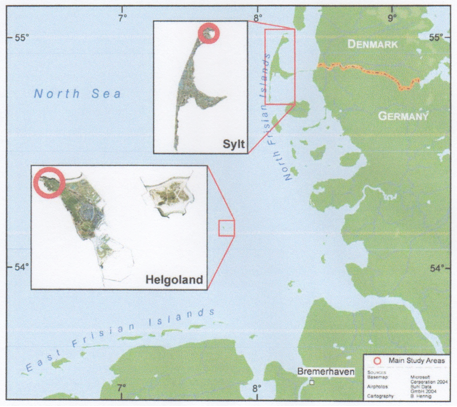
Source: Hennig, Benjamin. hennig-online.net, "Applications of hyperspectral remote sensing in coastal ecosystems: A case study from the German North Sea ." Last modified 2007. Accessed October 1, 2013. http://www.hennig-online.net/benjamin/.
Appendix B
Figure 2. Location of Royal Navy 'observational blockade' plan 1912.
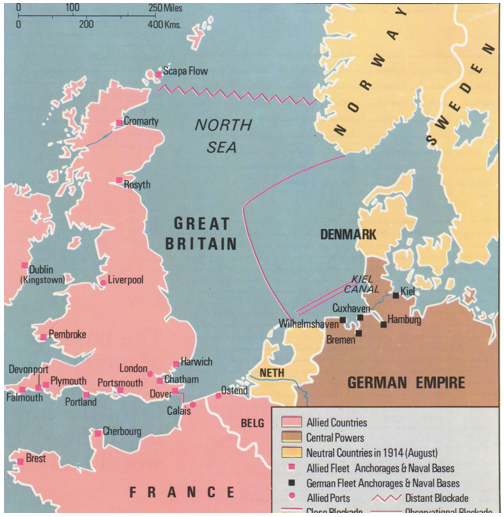
Source: The Marshall Cavendish Illustrated Encyclopedia of World War 1 (New York: Marshall Cavendish Corporation, 1984): 177.
Appendix C
Figure 3. Site of Royal Navy 'distant blockade' plan established 1914-1919

Source: Virneth Studios Ltd "The Battle of Jutland 31st May 1916 - Background." Accessed September 30, 2013. http://www.3dhistory.co.uk/ww1/naval-warfare/jutland-backgound.php.
Appendix D
Figure 4. Schlieffen plan as executed on the western front in August 1918.
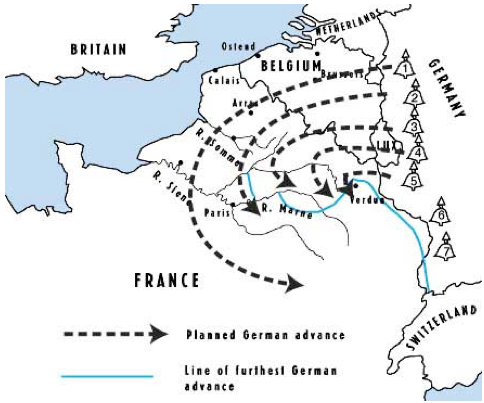
Source: "Battle and Conflict; The Schlieffen plan" Accessed October 13, 2013. http://www.jeron.je/anglia/learn/sec/history/ww1/page07.htm
Appendix E
Table 2.1. German import statistics from 1899-1913
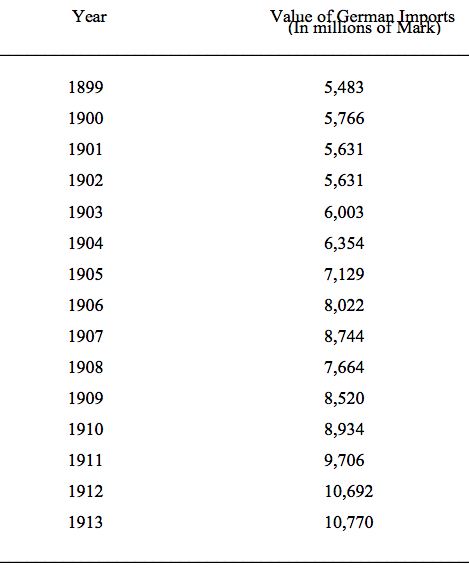
Source: Molodowsky N. "German Foreign Trade Terms 1899-1913" The Quarterly Journal of Economics, 41, no. 4 (Aug 1927): 666.
Appendix F
Table 2.2. Strikes in Germany 1914-1918
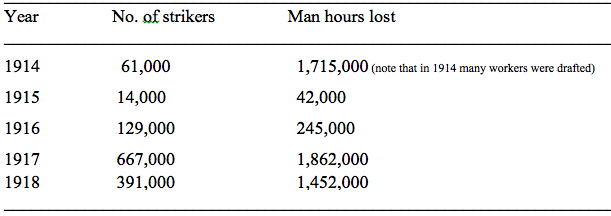
Source: Ferguson, Niall, The Pity of War (Great Britain: The Penguin Group, 1998): 275
Appendix H
Figure 6 Weights of German Farm animals when slaughtered 1913-1918.
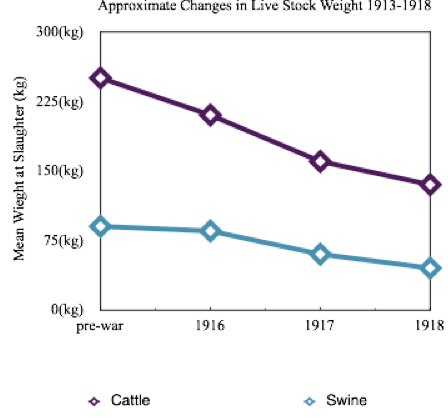
Source: Van Der Kloot, William. Ernst Starling's Analysis of the Energy Balance of the German People During the Blockade 1914-1919." Notes and records of the Royal Society of London. Vol. 57, No. 2 (May 2003): 189.
Appendix I
Table 1.3 Women convicted of crimes 1913-1918
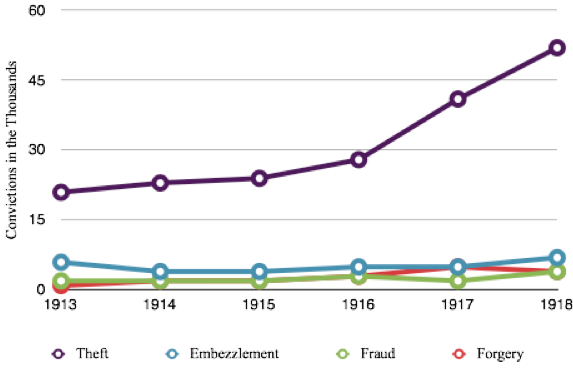
Source: Belinda Davis, Food Politics, and Everyday Life in World War I Berlin: Home Fires Burning, (Chapel Hill & London: University of North Carolina Press, 2000), 223.
Endnotes
1.) Osborne, Eric. Britain's Economic Blockade of Germany 1914-1919, (London & New York: Frank Cass, 2004), 1.
2.) Kennedy, Greg. "Intelligence and the Blockade, 1914-1917: A Study in Administration, Friction and Command." Intelligence and National security. no. 5 (Oct. 2007): 700.
3.) Tomes Jason, Balfour and foreign policy - The International Thoughts of a Conservative Statesman, (Cambridge : Cambridge University Press, 1997), 133-134.
4.) Kemp, Peter, The Marshall Cavendish Illustrated Encyclopedia of World War 1, (New York: Marshall Cavendish Corporation, 1984): 182.
5.) Kemp Peter, The Marshall Cavendish Illustrated Encyclopedia of World War 1, (New York: Marshall Cavendish Corporation, 1984): 182.
6.) Ibid., p. 182.
7.) Kennedy, Greg. "Intelligence and the Blockade, 1914-1917: A Study in Administration, Friction and Command." Intelligence and National security. no. 5 (Oct. 2207): 701.
8.) Ibid., p. 710.
9.) Ibid., p. 716.
10.) Siney, Marion. The allied blockade of Germany 1914-1916. The University of Michigan Press: Ann Arbor. (1957): 24.
11.) McDermott, John. "Trading With the Enemy: British Business and the Law During the First World War." Canadian Journal of History/Annales canadiennes d'histoire XXXII. (Aug 1997): 202-203.
12.) Ibid., p. 209.
13.) Ibid., p. 210.
14.) O'Brien, Patrick. "The Economic Effects of The Great War." History Today. no. 12 (Dec. 1994): 22.
15.) Siney, Marion. The allied blockade of Germany 1914-1916. The University of Michigan Press: Ann Arbor. (1957): 34.
16.) Ethel Phillips, "American Participation in Belligerent Commercial Controls 1914-1917," American Society of International Law, 27, no. 4 (1933): 684.
17.) Kennedy, Greg. "Intelligence and the Blockade, 1914-1917: A Study in Administration, Friction and Command." Intelligence and National security. no. 5 (Oct. 2207): 709-710.
18.) Ibid., p. 686.
19.) Strachan, Hew. The First World War. New York: Penguin Books. (2005) 217.
20.) United Kingdom National Archives, "Memorandum to the War Cabinet on Trade Blockade ." Note 2. Accessed September 15, 2013. http://www.nationalarchives.gov.uk/pathways/firstworldwar/spotlights/blockade.htm.
21.) Ibid., Note 2.
22.) Ibid., Note 3.
23.) Molodowsky, N "German Foreign Trade Terms in 1899-1913," The Quarterly Journal of Economics, 41, no. 4 (Aug 1927): 666.
24.) Ibid., p. 688.
25.) Van Der Kloot, William. "Ernst Starling's Analysis of the Energy Balance of the German People During the Blockade 1914-1919." Notes and records of the Royal Society of London. Vol. 57, No. 2 (May 2003): 187.
26.) Paul Vincent, The Politics of Hunger: The Allied Blockade of Germany 1915-1919, (Athens, Ohio London: Ohio University Press, 1985), 5.
27.) Tuchman, Barbara, The Guns of August, (New York: Macmillan, 1962), 20.
28.) Ibid., p. 21.
29.) Ibid., p 128-129.
30.) Kunkel, B.W. "Calories and Vitamines," The Scientific Monthly, 17, no. 4 (1923): 364,
31.) Van Der Kloot, William. "Ernst Starling's Analysis of the Energy Balance of the German People During the Blockade 1914-1919." Notes and records of the Royal Society of London. Vol. 57, No. 2 (May 2003): 189.
32.) Richter Lina, Family Life In Germany under The Blockade, (London: National Labour Press Limited, 1919), 21.
33.) Vincent, Paul The Politics of Hunger: The Allied Blockade of Germany 1915-1919, (Athens, Ohio London: Ohio University Press, 1985), 21.
34.) George Schreiner, The Iron Ration Three Years in Warring Central Europe, (New York and London: Harper & Brothers Publishing, 1918), 174.
35.) N/A, History of World War I, (Tarrytown: Marshall Cavendish Corporation, 2002), 658.
36.) Ibid., p. 665.
37.) Strachan, Hew. The First World War. New York: Penguin Books. (2005) 218.
38.) Ibid., p. 218.
39.) Ibid., p. 218.
40.) Churchill, Winston The World Crisis, (New York: Free Press, 1931), 686.
41.) Siney, Marion. The allied blockade of Germany 1914-1916. The University of Michigan Press: Ann Arbor. (1957): 47.
42.) United Kingdom National Archives, "Memorandum to the War Cabinet on Trade Blockade ." Note 1. Accessed September 15, 2013. http://www.nationalarchives.gov.uk/pathways/firstworldwar/spotlights/blockade.htm.
43.) Strachan, Hew. The First World War. New York: Penguin Books. (2005) 215.
44.) Van Der Kloot, William. "Ernst Starling's Analysis of the Energy Balance of the German People During the Blockade 1914-1919." Notes and records of the Royal Society of London. Vol. 57, No. 2 (May 2003): 189-190.
45.) Vincent, Paul The Politics of Hunger: The Allied Blockade of Germany 1915-1919, (Athens, Ohio London: Ohio University Press, 1985), 138.
46.) Richter Lina, Family Life In Germany under The Blockade, (London: National Labour Press Limited, 1919), 32.
47.) Vincent, Paul, The Politics of Hunger: The Allied Blockade of Germany 1915-1919, (Athens, Ohio London: Ohio University Press, 1985), 137.
48.) Ibid., p. 128.
49.) Richter Lina, Family Life In Germany under The Blockade, (London: National Labour Press Limited, 1919), 22.
50.) Vincent, Paul The Politics of Hunger: The Allied Blockade of Germany 1915-1919, (Athens, Ohio London: Ohio University Press, 1985), 128.
51.) Miles Bouton, And The Kaiser Abdicates, (New haven: Yale University Press, 1920), 73.
52.) Richter Lina, Family Life In Germany under The Blockade, (London: National Labour Press Limited, 1919), 29.
53.) Ibid., p. 45.
54.) Ibid., p. 45-46.
55.) Zweiniger-Bargielowska Ina, Duffett Rachel, and Drouard Alain, Food and War in Twentieth Century Europe, (Burlington: Ashgate Publishing Limited , 2001), 15.
56.) Van Der Kloot, William. "Ernst Starling's Analysis of the Energy Balance of the German People During the Blockade 1914-1919." Notes and records of the Royal Society of London. Vol. 57, No. 2 (May 2003): 190.
57.) Miles Bouton, And The Kaiser Abdicates, (New haven: Yale University Press, 1920), 73.
58.) Dana Munro, George Sellery, and August Krey, German Treatment of Conquered Territory , (Washington : The Committee on Public Information , 1918).16-17.
59.) Vincent, Paul The Politics of Hunger: The Allied Blockade of Germany 1915-1919, (Athens, Ohio London: Ohio University Press, 1985), 131.
60.) Belinda Davis, Food Politics, and Everyday Life in World War I Berlin: Home Fires Burning, (Chapel Hill & London: University of North Carolina Press, 2000), 201.
61.) Murray Rothbard, Herbert Hoover - The Great War and Its Aftermath, (Iowa City: University of Iowa Press, 1979), 93.
62.) Belinda Davis, Food Politics, and Everyday Life in World War I Berlin: Home Fires Burning, (Chapel Hill & London: University of North Carolina Press, 2000), 210-211.
63.) Ibid., p. 210
64.) Fritzsche Peter, Germans into Nazis, (Cambridge: Harvard University Press, 1998), 31.
65.) Belinda Davis, Food Politics, and Everyday Life in World War I Berlin: Home Fires Burning, (Chapel Hill & London: University of North Carolina Press, 2000), 231.
66.) Richter Lina, Family Life In Germany under The Blockade, (London: National Labour Press Limited, 1919), 51-52.
67.) Belinda Davis, Food Politics, and Everyday Life in World War I Berlin: Home Fires Burning, (Chapel Hill & London: University of North Carolina Press, 2000),193.
68.) Lohr, Eric, A call to Arms: Propaganda, Public Opinion, and Newspapers in the Great War, (WestPort CT: Praeger Publishers, 2004), 91.
69.) Hillgruber, Andreas. The Marshall Cavendish Illustrated Encyclopedia of World War 1 (New York: Marshall Cavendish Corporation, 1984): 182. 2610.
70.) Ibid., p. 2613.
71.) David Englander, The Oxford Illustrated History of the First World War, (oxford: Oxford University Press, 1998), 198-199.
72.) Vincent, Paul The Politics of Hunger: The Allied Blockade of Germany 1915-1919, (Athens, Ohio London: Ohio University Press, 1985), 124.
73.) Hancock W.K., and Van Der Poel, Jean. Selections from the Smuts Papers: Volume IV November 1918-August 1919, (Cambridge : Cambridge University Press, 2007), 271.

















